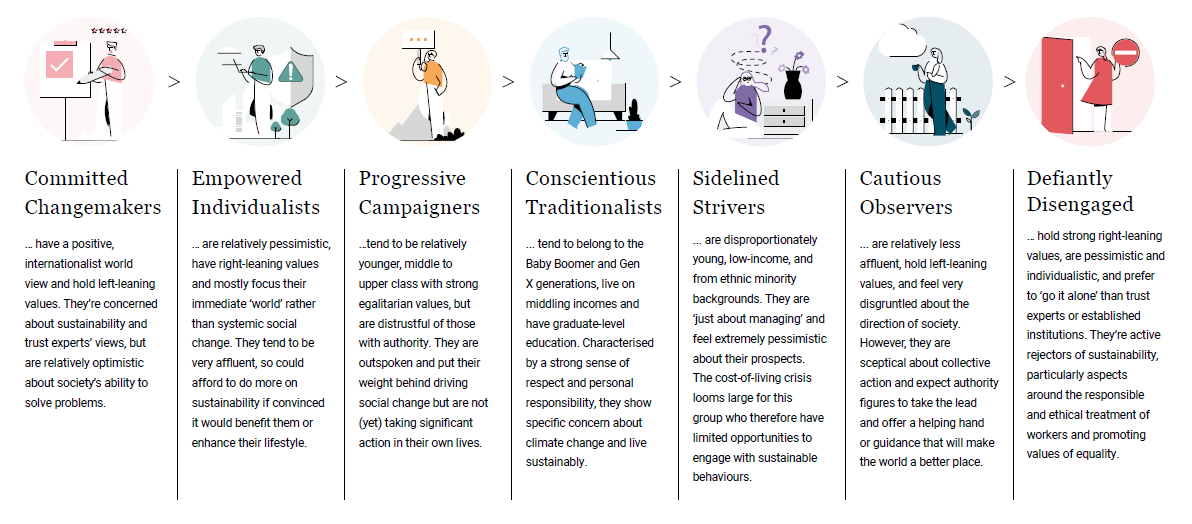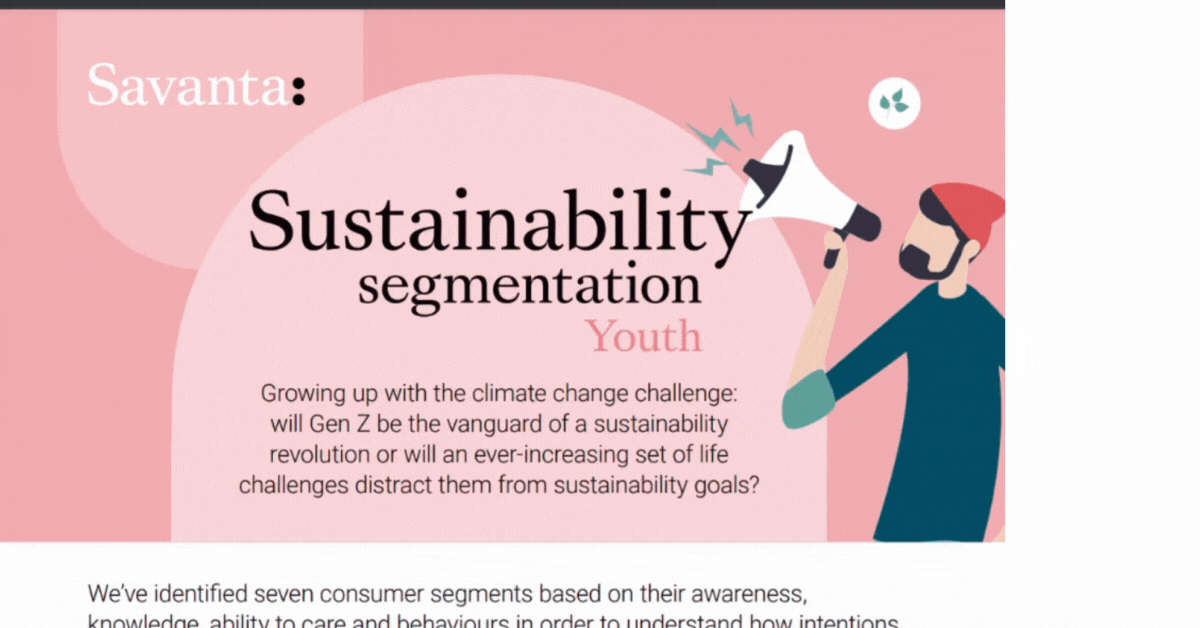
More than 8 in 10 young people said they want to share ideas and experiences with brands to develop better ethical solutions.
Within our recent Sustainability Segmentation report, we identified seven consumer segments based on their awareness, knowledge, ability to care and behaviours, in order to understand how intentions and actions towards sustainability vary.
At first glance, the outlook is concerning. A quarter of 18-24 year olds are in the Sidelined Strivers segment – those who feel excluded and disillusioned, ‘just about managing’ and taking little action on sustainability so far. However, more encouragingly, just over half (53%) are Committed Changemakers (15%), Empowered Individualists (19%) or Progressive Campaigners (19%). These segments are most concerned about sustainability (read more about the segments here).
Strong intentions but limited actions… for now
Recent global events and crisis’ have held Gen Z back from reaching their sustainability goals. Like everyone else, 18-24s see the cost-of-living crisis as the biggest challenge today (32%), followed by mental health (22%) and then climate change (19%) completes their top three.
Despite the challenges, Gen Z are most likely to read books, watch documentaries or listen to podcasts about sustainability, compared to other generations. They’re also the most likely age group to have signed a petition, donated to charity and/or attended a protest/march in support of sustainable issues.
Download our infographic to view the limitations Gen Z are facing and the actions they’re taking.
Gen Z need more education, support and opportunities
In many ways, young people are pushing sustainability to the top of the agenda and holding brands accountable. Yet in other ways, they have more to learn.
In our survey, a quarter of Gen Z said they want to live in a more sustainable way but aren’t sure how to. We also found that this young generation are less likely to make small daily changes, such as washing laundry on a lower temperature or waiting for a full load; leaving the heating on; leaving electronic devices on standby. This may change as young people take on more household responsibility – after all, over half (55%) aren’t yet in charge of their home’s energy and utilities.
This presents an opportunity for brands to take the lead, by improving access to sustainable products and services, as well as providing blueprints on how to live more sustainably. But it’s not enough for brands to take a ‘tick-box’ approach.
Gen Z want their voice to be heard and are keen to work with companies. More than 8 in 10 young people said they want to share ideas and experiences with brands to develop better ethical solutions.
By bringing young people into the conversation, you’re more likely to gain their trust and avoid greenwashing.
Download our infographic to view how brands can support Gen Z’s sustainable goals
So what: top tips for businesses
- Avoid greenwashing: brands’ initiatives must be credible and genuinely well-intentioned, otherwise Gen Z will likely dismiss them
- Ensure value is a priority: while some may be willing to pay a premium, long-term progress will only come through greater access to sustainable offerings
- Collaborate: brands must collaborate with young people on sustainability to create change
About our Sustainability Segmentation
Our Sustainability Segmentation uncovers how society is embracing – or resisting – a desire to meet sustainable goals, even during a deep and global economic crisis, setting out to help marketers effectively communicate, and market, sustainability in a manner that directly connects with customer values.
The seven segments identified within the report are based on consumer awareness, knowledge, ability to care and behaviours; from Committed Changemakers who have a positive, internationalist world view and hold left-leaning values to the Defiantly Disengaged, those holding strong right-leaning values, who are pessimistic and individualistic and prefer to ‘go it alone’ than trust experts or established institutions.
Download our free report here to read more about your audience segments.
Notes:
The report is based on the findings of a survey of 12,016 adults aged 18+ in the United Kingdom (5,005), United States (5,006) and Canada (2,005). Data are weighted to be representative of age, gender, region and social grade (UK) or income/education (US and Canada).
Our segments include:

Download the full report:






